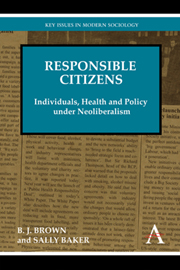Book contents
- Frontmatter
- Contents
- Acknowledgements
- Preface
- Chapter One Introduction
- Chapter Two Individualism, Neoliberalism and the Imperatives of Personal Governance
- Chapter Three Individualism in Healthcare
- Chapter Four Enlisting, Measuring and Shaping the Individual in Healthcare Policy and Practice
- Chapter Five Mental Health and Personal Responsibility
- Chapter Six Responsibility in Therapy and the Therapeutic State
- Chapter Seven The Punitive Turn in Public Services: Coercing Responsibility
- Chapter Eight Thinking about Ourselves
- Chapter Nine Talking Citizenship into Being
- References
- Index
Chapter Nine - Talking Citizenship into Being
Published online by Cambridge University Press: 05 December 2012
- Frontmatter
- Contents
- Acknowledgements
- Preface
- Chapter One Introduction
- Chapter Two Individualism, Neoliberalism and the Imperatives of Personal Governance
- Chapter Three Individualism in Healthcare
- Chapter Four Enlisting, Measuring and Shaping the Individual in Healthcare Policy and Practice
- Chapter Five Mental Health and Personal Responsibility
- Chapter Six Responsibility in Therapy and the Therapeutic State
- Chapter Seven The Punitive Turn in Public Services: Coercing Responsibility
- Chapter Eight Thinking about Ourselves
- Chapter Nine Talking Citizenship into Being
- References
- Index
Summary
Introduction: The Fulfilled, Responsible Citizen
In this final chapter we will consider how citizenship is at present talked about and show how these current discourses fit with the kinds of issues discussed earlier in this book. We have talked of citizens throughout this volume, but in this chapter we will extend some of the reflections on citizenship with which we began at the outset, exploring some of the kinds of citizenship discussed and the relationship with which citizens are being brought into with one another and with themselves. Olson's (2008, 40) definition of citizenship as pertaining to the ‘status of individuals in relation to a political unit’ could embrace political units or polities in the form of regimes comprising impersonal institutions and offices involved in governance, as well as political units comprised of publics, political movements or communities. As we have seen, both strands may be activated in contemporary manifestations of responsibilization, with exhortations from policymakers on the one hand and movements of citizens themselves on the other. These citizens might, for example, be desirous of undertaking therapy, self-help or participating in health screening schemes.
As Perron et al. (2010) describe, citizenship could be conceptualized as a right or an entitlement, a responsibility, a status, a practice, a process and an outcome. In addition, it is sometimes formulated as a ‘reciprocal relationship between the state and individuals’ (George, Lee et al. 2003, 71). Condor (2011) reminds us that attempts to understand citizenship are characterized by disagreement and citizenship constitutes an exemplary instance of what Gallie (1956, 169) termed an ‘essentially contested’ concept: an idea which is complex, normatively laden, and which involves ‘endless disputes about [its] proper use’.
- Type
- Chapter
- Information
- Responsible CitizensIndividuals, Health and Policy under Neoliberalism, pp. 163 - 182Publisher: Anthem PressPrint publication year: 2012



